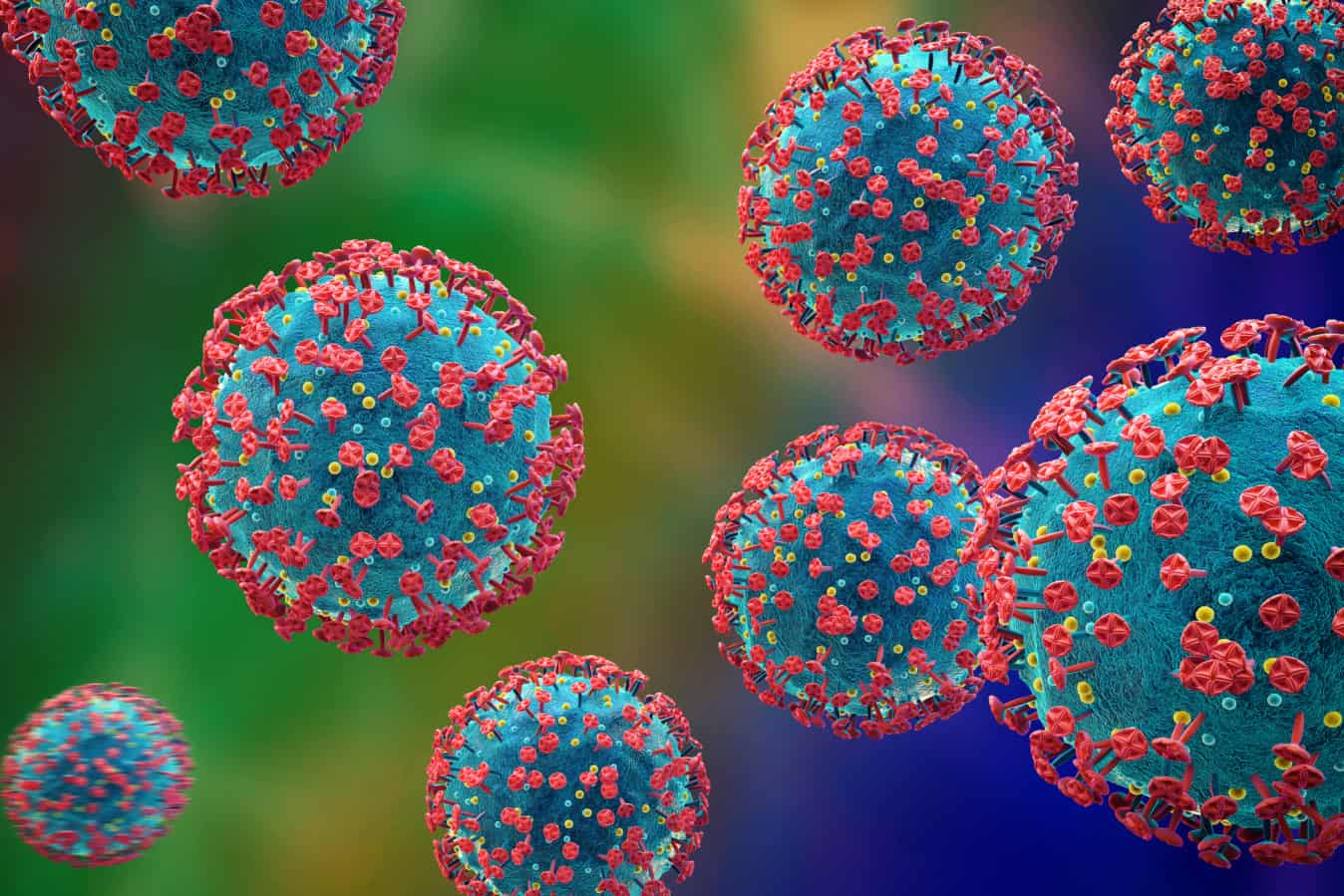The Omicron variant is fast becoming the dominant COVID-19 strain in Australia and other countries. Early evidence suggests that while highly infectious and less responsive to existing vaccines, a two-dose regimen followed by a third booster dose of Pfizer or Moderna may provide good protection against severe illness, hospitalisation, and death.
Introduction
On 24 November 2021, a new SARS-CoV-2 variant first identified in Botswana and South Africa, was reported to the World Health Organization (WHO). On 26 November the WHO categorised and named this variant Omicron (B.1.1.529) as a variant of concern.1 With a remarkably large number of mutations (approximately 30), the Omicron variant possesses both novel mutations that differentiate it from earlier variants,2 as well as mutations shared by others.3,4 This observation has raised considerable concern that Omicron may have a greater ability to evade the immune responses mobilised by the body following both previous infection by another variant and vaccinations.5
Current reports suggest that Omicron is spreading significantly faster than previous variants including Delta and is already or soon to be the dominant strain in many countries including Australia.6 Because of this, healthcare systems and hospitals are at risk of becoming overburdened by patients presenting with suspected or confirmed COVID-19 infection despite high levels of vaccine coverage.
Despite signs that Omicron is highly infectious, emerging evidence also suggests that the variant may result in less severe illness and death and that vaccination, while somewhat less effective, still provides valuable protection especially against the worst outcomes following two initial doses and an mRNA vaccine booster three to four months following the second dose.
Emerging evidence
As a new variant, the evidence base regarding Omicron is still limited in terms of quantity, detail, and quality. While many studies have not yet been peer-reviewed, involve small sample sizes, are based on data from countries that may not share the same characteristics as Australia, or are restricted in scope and outcome measures, preliminary findings can still help guide early understandings of the variant.
As new evidence emerges, there is a strong focus on how the genetic and epidemiological characteristics of Omicron impact on vaccine effectiveness, immune avoidance, infectivity/transmissibility, disease severity, and relationship with outcomes including hospital admissions, intensive care unit (ICU) admissions, ventilator use, and death.
Infectiousness
Emerging evidence appears to suggest that due to a relatively large number of mutations the Omicron variant is more highly contagious than other variants including Delta.7,4,8 This has resulted in the rapid growth in the number of cases in countries where Omicron has been identified including Australia. A validated artificial intelligence (AI) model has suggested that Omicron may be more than 10 times more contagious than the original virus and almost three times more contagious than the Delta strain.8
Severity
Emerging evidence appears to indicate that disease severity associated with the Omicron variant may be lower than for other variants including Delta however at this stage, evidence is limited and inconsistent. Some findings suggest that in comparison to previous waves, hospitalisations and deaths are not increasing at the same rate despite markedly increasing case numbers.9
In South Africa, a country with high levels of COVID-19 infection from earlier waves, the Omicron variant appears to result in lower hospitalisation and rates of severe disease in comparison to Delta.9 One study conducted in a large hospital in South Africa found that ICU admissions during the Omicron wave was 1% compared with 4.3% in previous waves and that fewer than half (45%) of patients in COVID-19 wards required oxygen supplementation compared with 99.5% in the earlier wave of cases.9
Between 1 October and 30 November 2021 those who contracted Omicron in South Africa were 80% less likely to be hospitalised than those diagnosed with another variant.10 Of those admitted however, rates of severity were comparable across all variants. In comparing rates of hospitalisation between those hospitalised with Omicron between October and November 2021 and with Delta between April and November, those who contracted Omicron were 70% less likely to develop severe disease.10 This study was conducted in a population with high rates of prior infection however, it is unclear how comparable these findings are to countries with low levels of prior infection such as Australia. In contrast with the findings of the South African study above, hospitalisation and asymptomatic infection indicators from data reported by Imperial College London suggest at most, limited changes in severity in comparison with Delta.11, 12
Immunity evasion
Emerging evidence suggests that prior infection with another strain of COVID-19 provides relatively limited immunity against the Omicron strain. Evidence from South Africa suggests Omicron is more successful at evading immunity conferred by prior infection than Alpha or Delta strains.13 Controlling for various factors including vaccine status and asymptomatic status, analysis from the United Kingdom (UK) suggests Omicron is associated with a 5.41 fold (95% CI: 4.87-6.00) higher risk of reinfection compared with Delta.11 Prior to Omicron, evidence of previous infection in healthcare workers suggested approximately 85% protection against reinfection, a five-fold reduction would suggest that this protection has now fallen to approximately 19% (95% CI: 0-27%).14
While Omicron does appear to be better able to evade immune responses, there is also emerging evidence that Omicron infection may enhance antibody neutralisation against the Delta strain.15 This, coupled with evidence that suggests that Omicron infections may be less severe, could indicate that infection by Omicron may confer enhanced protection against Delta infection and thus have positive implications for a decreased COVID-19 disease burden on individuals and healthcare systems. Another study found that previous infection with another strain may also confer additional immune protection against Omicron particularly when combined with vaccination (Pfizer) and possibly a booster dose.16
Vaccine evasion
Emerging evidence suggests that the Omicron variant is better able to evade the body’s immune response to infection following prior vaccination than earlier variants.8, 17 This may result in a greater number of vaccine ‘break-through’ infections among people who have been vaccinated. The AI-model used to calculate the relative infectiousness of Omicron suggested that the Omicron strain may be around 14 times more able to evade vaccine-induced immunity compared to the Delta strain.8
Laboratory studies have shown a similar reduction in vaccine efficacy.18 Using neutralising antibody levels to predict immune protection,19 the neutralising efficacy of vaccine-elicited sera was found to be severely reduced against Omicron.20, 18 Laboratory evidence shows low neutralisation efficacy against Delta variants following a two dose Pfizer regimen, and no neutralisation efficiency against Omicron.21 Although there is substantial evidence to suggest waning vaccine effectiveness over a period of six months,22 these findings indicate a likely reduction in the effectiveness of both Pfizer and Moderna vaccines in preventing symptomatic illness from Omicron following a two dose schedule.
Booster doses
Booster vaccinations are an important line of defence against the Omicron outbreak especially among people at high risk of infection (eg. health and aged care workers) and those with weakened immune systems.18,23,24 A recent literature review found that all included studies confirmed that booster doses were effective in eliciting a sustained immune response to Omicron infection.17 In another study, 90% of mRNA vaccine boosted people exhibited neutralising antibody activity against the Omicron strain.18
Booster doses are also very important for people who received their second dose three to four months previously. Emerging evidence suggests that an mRNA (ie. Pfizer or Moderna) booster dose provides better protection than two doses of a COVID-19 vaccine.25 In a UK study, primary immunisation of two Pfizer or AstraZeneca doses provided little or no protection against symptomatic disease with the Omicron variant.25 At 15 weeks following two AstraZeneca doses there was no effect against Omicron, while at two to nine weeks Pfizer provided 88% protection (95% CI: 65.9 to 95.8%) dropping to 34 – 37% from 15 weeks after the second dose. In the first two weeks after a Pfizer booster however, effectiveness increased to 71.4% (95% CI: 41.8 – 86.0%) following a primary course of AstraZeneca, and 75.5% (95% CI: 56.1 to 86.3%) following a primary course of Pfizer. These estimates however are largely limited by the small number of UK Omicron cases at the time of the study and do not provide an indication of booster or vaccine effectiveness in reducing risk of severe disease.
Laboratory studies have also provided evidence to suggest booster doses increase protection against Omicron. No neutralisation efficiency was shown against Omicron longer than five months following a second Pfizer dose, however those who had received a Pfizer booster dose exhibited a 100-fold increase in the level of neutralising antibodies against the variant.21 Similarly a 50µg Moderna booster significantly increased levels of antibody neutralisation to levels of effectiveness comparable to a two dose regime against alpha and beta variants.26
*ALERT* Evidence regarding COVID-19 is continually evolving, so this article may not include the very latest evidence in real-time.
References
-
World Health Organization (WHO). Classification of Omicron (B.1.1.529): SARS-CoV-2 Variant of Concern. Online: World Health Organization (WHO). 2021. Available: https://www.who.int/news/item/26-11-2021-classification-of-omicron-(b.1.1.529)-sars-cov-2-variant-of-concern
-
Berkowitz B and Steckelberg A. Understanding omicron’s many mutations. Online: Wahsington Post. 2021. Available: https://www.washingtonpost.com/health/2021/12/16/omicron-variant-mutations-covid/
-
Kannan S, Shaik Syed Ali P and Sheeza A. Omicron (B.1.1.529) – variant of concern – molecular profile and epidemiology: a mini review. Eur Rev Med Pharmacol Sci 2021; 25: 8019-8022. 2022/01/05. DOI: 10.26355/eurrev_202112_27653.
-
He X, Hong W, Pan X, et al. SARS-CoV-2 Omicron variant: Characteristics and prevention. MedComm (2020) 2021; 2: 838-845. 2021/12/28. DOI: 10.1002/mco2.110.
-
World Health Organization (WHO). Weekly epidemiological update on COVID-19 – 21 December 2021. Online: World Health Organization (WHO). 2021. Available: https://www.who.int/publications/m/item/weekly-epidemiological-update-on-covid-19—21-december-2021
-
World Health Organization (WHO). Enhancing Readiness for Omicron (B.1.1.529): Technical Brief and Priority Actions for Member States. Online: World Health Organization (WHO). 2021. Available: https://www.who.int/publications/m/item/enhancing-readiness-for-omicron-(b.1.1.529)-technical-brief-and-priority-actions-for-member-states (2021).
-
Meo SA, Meo AS, Al-Jassir FF, et al. Omicron SARS-CoV-2 new variant: global prevalence and biological and clinical characteristics. Eur Rev Med Pharmacol Sci 2021; 25: 8012-8018. 2022/01/05. DOI: 10.26355/eurrev_202112_27652.
-
Chen J, Wang R, Gilby NB, et al. Omicron Variant (B.1.1.529): Infectivity, Vaccine Breakthrough, and Antibody Resistance. J Chem Inf Model 2022 2022/01/07. DOI: 10.1021/acs.jcim.1c01451.
-
Abdullah F, Myers J, Basu D, et al. Decreased severity of disease during the first global omicron variant covid-19 outbreak in a large hospital in tshwane, south africa. Int J Infect Dis 2021 2022/01/01. DOI: 10.1016/j.ijid.2021.12.357.
-
Wolter N, Jassat W, Walaza S, et al. Early assessment of the clinical severity of the SARS-CoV-2 Omicron variant in South Africa. medRxiv 2021: 2021.2012.2021.21268116. DOI: 10.1101/2021.12.21.21268116.
-
Ferguson N, Ghani A, Cori A, et al. Report 49 – Growth, population distribution and immune escape of Omicron in England. Online: Imperial College London. 2021. Available: https://www.imperial.ac.uk/mrc-global-infectious-disease-analysis/covid-19/report-49-Omicron/
-
Ledford H. How severe are Omicron infections?. Online: Nature. 2021. Available: https://www.nature.com/articles/d41586-021-03794-8
-
Pulliam JRC, van Schalkwyk C, Govender N, et al. Increased risk of SARS-CoV-2 reinfection associated with emergence of the Omicron variant in South Africa. medRxiv 2021: 2021.2011.2011.21266068. DOI: 10.1101/2021.11.11.21266068.
-
Head E and van Elsland S. Omicron largely evades immunity from past infection or two vaccine doses. Online: Imperial College London. 2021. Available: https://www.imperial.ac.uk/news/232698/modelling-suggests-rapid-spread-omicron-england/
-
Khan K, Karim F, Cele S, et al. Omicron infection enhances neutralizing immunity against the Delta variant. medRxiv 2021 2022/01/05. DOI: 10.1101/2021.12.27.21268439.
-
Cele S, Jackson L, Khan K, et al. SARS-CoV-2 Omicron has extensive but incomplete escape of Pfizer BNT162b2 elicited neutralization and requires ACE2 for infection. medRxiv 2021 2021/12/16. DOI: 10.1101/2021.12.08.21267417.
-
Lippi G, Mattiuzzi C and Henry BM. Neutralizing potency of COVID-19 vaccines against the SARS-CoV-2 Omicron (B.1.1.529) variant. J Med Virol 2022 2022/01/07. DOI: 10.1002/jmv.27575.
-
Edara VV, Manning KE, Ellis M, et al. mRNA-1273 and BNT162b2 mRNA vaccines have reduced neutralizing activity against the SARS-CoV-2 Omicron variant. bioRxiv 2021 2022/01/05. DOI: 10.1101/2021.12.20.473557.
-
Khoury DS, Cromer D, Reynaldi A, et al. Neutralizing antibody levels are highly predictive of immune protection from symptomatic SARS-CoV-2 infection. Nature Medicine 2021; 27: 1205-1211. DOI: 10.1038/s41591-021-01377-8.
-
Wilhelm A, Widera M, Grikscheit K, et al. Reduced Neutralization of SARS-CoV-2 Omicron Variant by Vaccine Sera and monoclonal antibodies. medRxiv 2021: 2021.2012.2007.21267432. DOI: 10.1101/2021.12.07.21267432.
-
Nemet I, Kliker L, Lustig Y, et al. Third BNT162b2 vaccination neutralization of SARS-CoV-2 Omicron infection. medRxiv 2021: 2021.2012.2013.21267670. DOI: 10.1101/2021.12.13.21267670.
-
Richterman A, Scott J and Cevik M. Covid-19 vaccines, immunity, and boosters. BMJ 2021; 375: n3105. DOI: 10.1136/bmj.n3105.
-
Lusvarghi S, Pollett SD, Neerukonda SN, et al. SARS-CoV-2 Omicron neutralization by therapeutic antibodies, convalescent sera, and post-mRNA vaccine booster. bioRxiv 2021 2022/01/05. DOI: 10.1101/2021.12.22.473880.
-
Garcia-Beltran WF, St Denis KJ, Hoelzemer A, et al. mRNA-based COVID-19 vaccine boosters induce neutralizing immunity against SARS-CoV-2 Omicron variant. medRxiv 2021 2021/12/22. DOI: 10.1101/2021.12.14.21267755.
-
Andrews N, Stowe J, Kirsebom F, et al. Effectiveness of COVID-19 vaccines against the Omicron (B.1.1.529) variant of concern. medRxiv 2021: 2021.2012.2014.21267615. DOI: 10.1101/2021.12.14.21267615.
-
Doria-Rose NA, Shen X, Schmidt SD, et al. Booster of mRNA-1273 Vaccine Reduces SARS-CoV-2 Omicron Escape from Neutralizing Antibodies. medRxiv 2021: 2021.2012.2015.21267805. DOI: 10.1101/2021.12.15.21267805.
Authors
Micah DJ Peters PhD and Casey Marnie are at the Australian Nursing and Midwifery Federation (ANMF) National Policy Research Unit (Federal Office), and the University of South Australia, Clinical and Health Sciences, Rosemary Bryant AO Research Centre









One Response
How can you quote from WHO. a bunch of crooks paid by the pharmas.